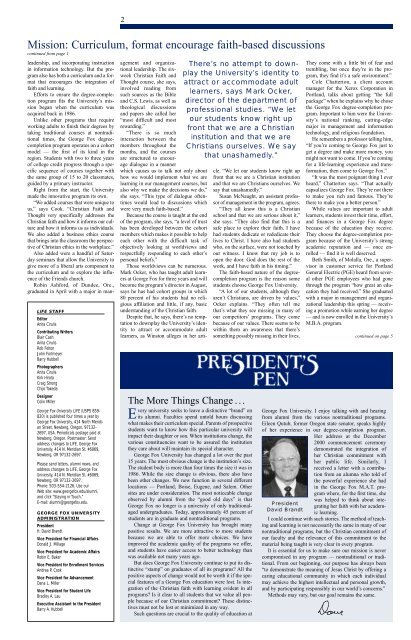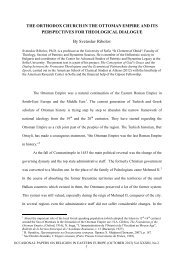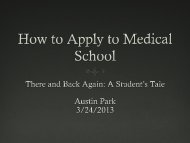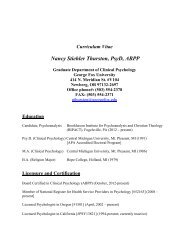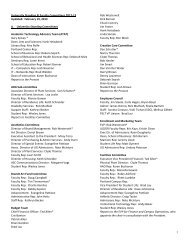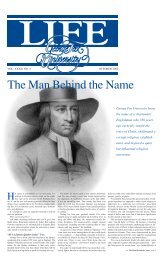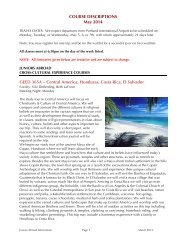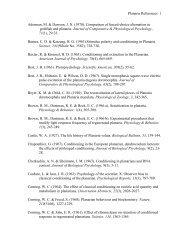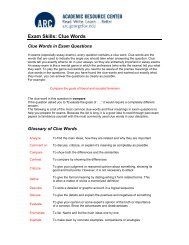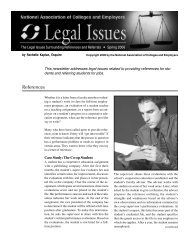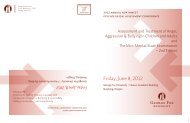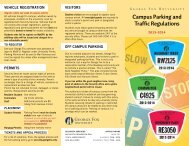Mission Accomplished - George Fox University
Mission Accomplished - George Fox University
Mission Accomplished - George Fox University
You also want an ePaper? Increase the reach of your titles
YUMPU automatically turns print PDFs into web optimized ePapers that Google loves.
2<br />
<strong>Mission</strong>: Curriculum, format encourage faith-based discussions<br />
continued from page 1<br />
leadership, and incorporating instruction<br />
in information technology. But the program<br />
also has both a curriculum and a format<br />
that encourages the integration of<br />
faith and learning.<br />
Efforts to ensure the degree-completion<br />
program fits the <strong>University</strong>’s mission<br />
began when the curriculum was<br />
acquired back in 1986.<br />
Unlike other programs that require<br />
working adults to finish their degrees by<br />
taking traditional courses at nontraditional<br />
times, the <strong>George</strong> <strong>Fox</strong> degreecompletion<br />
program operates on a cohort<br />
model — the first of its kind in the<br />
region. Students with two to three years<br />
of college credit progress through a specific<br />
sequence of courses together with<br />
the same group of 15 to 20 classmates,<br />
guided by a primary instructor.<br />
Right from the start, the <strong>University</strong><br />
made the innovative program its own.<br />
“We added courses that were unique to<br />
us,” says Cook. “Christian Faith and<br />
Thought very specifically addresses the<br />
Christian faith and how it informs our culture<br />
and how it informs us as individuals.<br />
We also added a business ethics course<br />
that brings into the classroom the perspective<br />
of Christian ethics in the workplace.”<br />
Also added were a handful of Saturday<br />
seminars that allow the <strong>University</strong> to<br />
give more of a liberal arts component to<br />
the curriculum and to explore the influence<br />
of the Friends church.<br />
Robin Ashford, of Dundee, Ore.,<br />
graduated in April with a major in man-<br />
LIFE STAFF<br />
Editor<br />
Anita Cirulis<br />
Contributing Writers<br />
Blair Cash<br />
Anita Cirulis<br />
Rob Felton<br />
John Fortmeyer<br />
Barry Hubbell<br />
Photographers<br />
Anita Cirulis<br />
Kirk Hirota<br />
Craig Strong<br />
Chijo Takeda<br />
Designer<br />
Colin Miller<br />
<strong>George</strong> <strong>Fox</strong> <strong>University</strong> LIFE (USPS 859-<br />
820) is published four times a year by<br />
<strong>George</strong> <strong>Fox</strong> <strong>University</strong>, 414 North Meridian<br />
Street, Newberg, Oregon, 97132-<br />
2697, USA. Periodicals postage paid at<br />
Newberg, Oregon. Postmaster: Send<br />
address changes to LIFE, <strong>George</strong> <strong>Fox</strong><br />
<strong>University</strong>, 414 N. Meridian St. #6069,<br />
Newberg, OR 97132-2697.<br />
Please send letters, alumni news, and<br />
address changes to LIFE, <strong>George</strong> <strong>Fox</strong><br />
<strong>University</strong>, 414 N. Meridian St. #6069,<br />
Newberg, OR 97132-2697.<br />
Phone: 503-554-2126. Use our<br />
Web site: www.georgefox.edu/alumni,<br />
and click “Staying in Touch.”<br />
E-mail: alumni@georgefox.edu.<br />
GEORGE FOX UNIVERSITY<br />
ADMINISTRATION<br />
President<br />
H. David Brandt<br />
Vice President for Financial Affairs<br />
Donald J. Millage<br />
Vice President for Academic Affairs<br />
Robin E. Baker<br />
Vice President for Enrollment Services<br />
Andrea P. Cook<br />
Vice President for Advancement<br />
Dana L. Miller<br />
Vice President for Student Life<br />
Bradley A. Lau<br />
Executive Assistant to the President<br />
Barry A. Hubbell<br />
agement and organizational<br />
leadership. The sixweek<br />
Christian Faith and<br />
Thought course, she says,<br />
involved reading from<br />
such sources as the Bible<br />
and C.S. Lewis, as well as<br />
There’s no attempt to downplay<br />
the <strong>University</strong>’s identity to<br />
attract or accommodate adult<br />
learners, says Mark Ocker,<br />
director of the department of<br />
professional studies. “We let<br />
our students know right up<br />
front that we are a Christian<br />
institution and that we are<br />
Christians ourselves. We say<br />
that unashamedly.”<br />
The More Things Change . . .<br />
Every university seeks to leave a distinctive “brand” on<br />
its alumni. Faculties spend untold hours discussing<br />
what makes their curriculum special. Parents of prospective<br />
students want to know how this particular university will<br />
impact their daughter or son. When institutions change, the<br />
various constituencies want to be assured the institution<br />
they care about will maintain its special character.<br />
<strong>George</strong> <strong>Fox</strong> <strong>University</strong> has changed a lot over the past<br />
15 years. The most obvious change is the institution’s size.<br />
The student body is more than four times the size it was in<br />
1986. While the size change is obvious, there also have<br />
been other changes. We now function in several different<br />
locations — Portland, Boise, Eugene, and Salem. Other<br />
sites are under consideration. The most noticeable change<br />
observed by alumni from the “good old days” is that<br />
<strong>George</strong> <strong>Fox</strong> no longer is a university of only traditionalaged<br />
undergraduates. Today, approximately 45 percent of<br />
students are in graduate and nontraditional programs.<br />
Change at <strong>George</strong> <strong>Fox</strong> <strong>University</strong> has brought many<br />
positive results. We are more attractive to more students<br />
because we are able to offer more choices. We have<br />
improved the academic quality of the programs we offer,<br />
and students have easier access to better technology than<br />
was available not many years ago.<br />
But does <strong>George</strong> <strong>Fox</strong> <strong>University</strong> continue to put its distinctive<br />
“stamp” on graduates of all its programs? All the<br />
positive aspects of change would not be worth it if the special<br />
features of a <strong>George</strong> <strong>Fox</strong> education were lost. Is integration<br />
of the Christian faith with learning evident in all<br />
programs? Is it clear to all students that we value all people<br />
because of our Christian commitment? These distinctives<br />
must not be lost or minimized in any way.<br />
Such questions are crucial to the quality of education at<br />
theological discussions<br />
and papers she called her<br />
“most difficult and most<br />
rewarding.”<br />
“There is so much<br />
interaction between the<br />
members throughout the<br />
months, and the courses<br />
are structured to encourage<br />
dialogue in a manner<br />
which causes us to talk not only about<br />
how we would implement what we are<br />
learning in our management courses, but<br />
also why we make the decisions we do,”<br />
she says. “This type of dialogue oftentimes<br />
would lead to discussions which<br />
were very much faith-based.”<br />
Because the course is taught at the end<br />
of the program, she says, “a level of trust<br />
has been developed between the cohort<br />
members which makes it possible to help<br />
each other with the difficult task of<br />
objectively looking at worldviews and<br />
respectfully responding to each other’s<br />
personal beliefs.”<br />
Those worldviews can be numerous.<br />
Mark Ocker, who has taught adult learners<br />
at <strong>George</strong> <strong>Fox</strong> for three years and will<br />
become the program’s director in August,<br />
says he has had cohort groups in which<br />
80 percent of his students had no religious<br />
affiliation and little, if any, basic<br />
understanding of the Christian faith.<br />
Despite that, he says, there’s no temptation<br />
to downplay the <strong>University</strong>’s identity<br />
to attract or accommodate adult<br />
learners, as Winston alleges in her article.<br />
“We let our students know right up<br />
front that we are a Christian institution<br />
and that we are Christians ourselves. We<br />
say that unashamedly.”<br />
Susan McNaught, an assistant professor<br />
of management in the program, agrees.<br />
“They all know this is a Christian<br />
school and that we are serious about it,”<br />
she says. “They also find that this is a<br />
safe place to explore their faith. I have<br />
had students dedicate or rededicate their<br />
lives to Christ. I have also had students<br />
who, on the surface, were not touched by<br />
our witness. I know that my job is to<br />
open the door. God does the rest of the<br />
work, and I have faith in his timing.”<br />
The faith-based nature of the degreecompletion<br />
program is the reason some<br />
students choose <strong>George</strong> <strong>Fox</strong> <strong>University</strong>.<br />
“A lot of our students, although they<br />
aren’t Christians, are driven by values,”<br />
Ocker explains. “They often tell me<br />
that’s what they see missing in many of<br />
our competitors’ programs. They come<br />
because of our values. There seems to be<br />
within them an awareness that there’s<br />
something possibly missing in their lives.<br />
<strong>George</strong> <strong>Fox</strong> <strong>University</strong>. I enjoy talking with and hearing<br />
from alumni from the various nontraditional programs.<br />
Eileen Qutub, former Oregon state senator, speaks highly<br />
of her experience in our degree-completion program.<br />
Her address at the December<br />
2000 commencement ceremony<br />
demonstrated the integration of<br />
her Christian commitment with<br />
President<br />
David Brandt<br />
They come with a little bit of fear and<br />
trembling, but once they’re in the program,<br />
they find it’s a safe environment.”<br />
Cole Chatterton, a client account<br />
manager for the Xerox Corporation in<br />
Portland, talks about getting “the full<br />
package” when he explains why he chose<br />
the <strong>George</strong> <strong>Fox</strong> degree-completion program.<br />
Important to him were the <strong>University</strong>’s<br />
national ranking, cutting-edge<br />
major in management and information<br />
technology, and religious foundation.<br />
He remembers a professor telling him,<br />
“If you’re coming to <strong>George</strong> <strong>Fox</strong> just to<br />
get a degree and make more money, you<br />
might not want to come. If you’re coming<br />
for a life-learning experience and transformation,<br />
then come to <strong>George</strong> <strong>Fox</strong>.”<br />
“It was the most poignant thing I ever<br />
heard,” Chatterton says. “That actually<br />
capsulizes <strong>George</strong> <strong>Fox</strong>. They’re not there<br />
to make you rich and famous. They’re<br />
there to make you a better person.”<br />
While values are important to adult<br />
learners, students invest their time, effort,<br />
and finances in a <strong>George</strong> <strong>Fox</strong> degree<br />
because of the education they receive.<br />
They choose the degree-completion program<br />
because of the <strong>University</strong>’s strong<br />
academic reputation and — once enrolled<br />
— find it is well deserved.<br />
Beth Smith, of Molalla, Ore., a supervisor<br />
in customer service for Portland<br />
General Electric (PGE) heard from several<br />
other PGE employees who had gone<br />
through the program “how great an education<br />
they had received.” She graduated<br />
with a major in management and organizational<br />
leadership this spring — receiving<br />
a promotion while earning her degree<br />
— and is now enrolled in the <strong>University</strong>’s<br />
M.B.A. program.<br />
continued on page 5<br />
her public life. Similarly, I<br />
received a letter with a contribution<br />
from an alumna who told of<br />
the powerful experience she had<br />
in the <strong>George</strong> <strong>Fox</strong> M.A.T. program<br />
where, for the first time, she<br />
was helped to think about integrating<br />
her faith with her academic<br />
learning.<br />
I could continue with such stories. The method of teaching<br />
and learning is not necessarily the same in many of our<br />
nontraditional programs, but the Christian commitment of<br />
our faculty and the relevance of this commitment to the<br />
material being taught is very clear in every program.<br />
It is essential for us to make sure our mission is never<br />
compromised in any program — nontraditional or traditional.<br />
From our beginning, our purpose has always been<br />
“to demonstrate the meaning of Jesus Christ by offering a<br />
caring educational community in which each individual<br />
may achieve the highest intellectual and personal growth,<br />
and by participating responsibly in our world’s concerns.”<br />
Methods may vary, but our goal remains the same.


